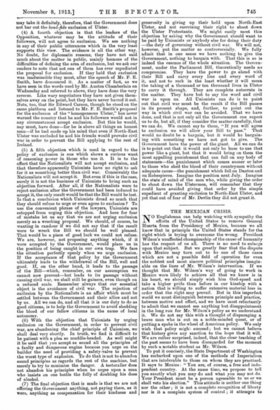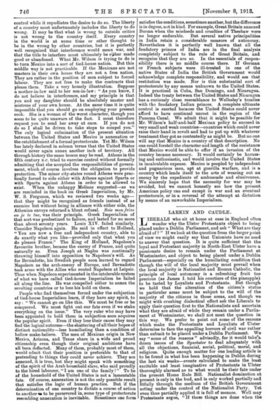THE MEXICAN CRISIS.
NO Englishman can help watching with sympathy the efforts of the United States to remove General Huerta from the Presidency of Mexico, because we all know that in principle the United States stands for the right which is trying to overcome the wrong. President Wilson's unaffected championship of the cause of humanity has the respect of us all. There is no need to enlarge upon that subject. But we greatly fear that the dispute with Mexico may turn out to be one of those cases which are not a possible field of operation for even the noblest and most sincere political principles imaginable on the lines of Mr. Wilson's intervention. If we thought that Mr. Wilson's way of going to work in Mexico were likely to achieve all that we know is in his heart, we should simply wish him God-speed and take a higher pride than before in our kinship with a nation that is willing to suffer extensive material loss in order that the right may prevail. But in this imperfect world we must distinguish between principle and practice, between motive and effect, and we have most reluctantly to admit that we cannot see anything but disappointment in the long run for Mr. Wilson's policy as we understand it. We do not say this with a thought of disparaging a brave man who is out on a noble-minded quest, or of putting a spoke in the wheel of American policy. We only wish that policy might succeed ; but we cannot believe that history gives any sanction to the hope that it will. We are rather surprised, indeed, that the clear teaching of the past seems to have been disregarded for the moment by such a notable student as Mr. Wilson. To put it concisely, the State Department of Washington has embarked upon one of the methods of Imperialism that are intolerable to those on whom they are practised. It says to Mexico : "You are, of course, a free and independent country. At the same time, we propose to tell you exactly what you may do and what you may not do. Your President must be a person agreeable to us or we shall veto his election." This attitude is neither one thing nor the other ; it is not a complete recognition of liberty nor is it a complete system of control ; it attempts to
control while it repudiates the desire to do so. The liberty of a country most unfortunately includes the liberty to do wrong. It may be that what is wrong to outside critics is not wrong to the country itself. Every country in the world is at some time or other thought to be in the wrong by other countries, but it is perfectly well recognized that interference would mean war, and that the title to interfere must ultimately be e;;-her made good or abandoned. What Mr. Wilson is trying to do is to turn Mexico into a sort of tied-house nation. But this middle way is not practicable. If the Mexicans are not masters in their own house they are not a free nation. They are rather in the position of men subject to forced labour. They are not free to make the contracts that please them. Take a very homely illustration. Suppose a mother-in-law said to her son-in-law : " As you know, I do not believe in interference, and my principle is that you and my daughter should be absolutely master and mistress of your own house. At the same time it is quite impossible that you should go on employing your present cook. She is a woman of the worst character, though you seem to be quite unaware of the fact. I must therefore request you to send her away at once. If you do not do so I shall be driven to take steps to compel you." The only logical culmination of the present situation between the United States and Mexico is annexation or the establishment of a formal protectorate. Yet Mr. Wilson has lately declared in solemn terms that the United States would never again annex another inch of territory. All through history the same lesson may be read. Athens in the fifth century B.C. tried to exercise control without formally admitting that she accepted the responsibilities of government, which of course involves the obligation to provide protection. The minor city-states round Athens were practically forced to side either with Athens against Sparta or with Sparta against Athens in order to be allowed to exist. When the unhappy Melians suggested—as we are reminded in the book on Greek Imperialism, by Mr. W. S. Ferguson, which we reviewed two weeks ago— that they might be recognized as friends instead of as enemies but without being in alliance with either side, the Athenian envoys returned a blunt refusal. Sois mom frt'!re on je te tue, was their principle. Greek Imperialism of that sort was predestined to failure, and lasted for no more than about seventy years. Louis XIV. failed similarly. Consider Napoleon again. He said in effect to Holland, "You are now a free and independent country, able to do exactly what you like—provided only that what you do pleases France." The King of Holland, Napoleon's favourite brother, became the enemy of France, and quite naturally so. Even Joseph at Naples was continually throwing himself into opposition to Napoleon's will. As for Bernadotte, his Swedish people soon learned to regard Napoleon as the arch-enemy of Europe, and Bernadotte took arms with the Allies who routed Napoleon at Leipsic. Thus when Napoleon experimented in the intolerable system of what we have called tied-house Imperialism he failed all along the line. He was compelled either to annex the revolting countries or to lose his hold on them. People who find themselves forced under the subjection of tied-house Imperialism learn, if they have any spirit, to say : "We cannot go on like this. We must be free or be conquered. We must fight out our fate even if we stake everything on the issue." The very ruler who may have been appointed to hold them in subjection soon acquires the popular spirit. Even if they lose their cause they may find the logical outcome—the shattering of all their hopes of distinct nationality—less humiliating than a condition of hollow make-believe. The men of Mexican origin in New Mexico, Arizona, and Texas share in a wide and proud citizenship even though their original ambitions have all been deflected. Many of them, probably most of them, would admit that their position is preferable to that of pretending to things they could never achieve. They are annexed, it is true, but they might speak with something of the spirit of the Arab household slave, who said proudly to the hired labourer, "I am one of the family ! " To be of the household of the United States is not a lamentable fate. Of course, annexation is not the only possible result that satisfies the logic of human practice. But if the determination of one country to dictate a course of action to another is to be persevered in, some type of protectorate resembling annexation is inevitable. Sometimes one form
Isatisfies the conditions, sometimes another, but the difference is in degree, not in kind. For example, Great Britain annexed Burma when the misdeeds and cruelties of Theebaw were no longer endurable. But several native principalities in India retain a considerable measure of autonomy. Nevertheless it is perfectly well known that all the feudatory princes of India are in the final analysis completely subject to the rule of Great Britain, and recognize that they are so. In the essentials of responsibility there is no middle course there. If German or French subjects were ill-treated in one of the native States of India, the British Government would acknowledge complete responsibility, and would see that restitution was made. Nor is this substantial sort of protectorate by any means unknown to the United States. It is practised in Cuba, San Domingo, and Nicaragua. Indeed the treaty between the United States and Nicaragua has a curiously close resemblance to Wellesley's treaties with th3 feudatory Indian princes. A complete ultimate control is exerted because the United States could never afford to have continual unrest in the region of the Panama Canal. We admit that it might be possible for Mr. Wilson's half-and-half Mexican policy to succeed in very small and weak countries—countries which could never raise their hand in revolt and had to put up with whatever treatment they got as contentedly as might be. But no one will say that Mexico is a country of that description. No one could foretell the character and length of the resistance that Mexico would be able to offer if an invasion of the country became necessary. It would certainly be harassing and enthusiastic, and would involve the United States in incalculable expense. Mexico is peopled by independent and pugnacious men, apt at guerilla warfare, and is a country which lends itself to the arts of wearing out an enemy by the expedients of ambuscade and elusiveness. We sincerely hope that the necessity for war may be avoided, but we cannot honestly see how the present American policy can end except in war and an eventual protectorate, or in a reversal of the attempt at dictation by means of an unworkable Imperialism.



















































 Previous page
Previous page